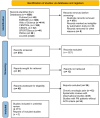Effects of acupuncture versus placebo on clinical status and potential specific effects in Fibromyalgia: an umbrella review of 11 meta-analyses
- PMID: 39165909
- PMCID: PMC11334136
- DOI: 10.1177/1759720X241271775
Effects of acupuncture versus placebo on clinical status and potential specific effects in Fibromyalgia: an umbrella review of 11 meta-analyses
Abstract
Background: The use of acupuncture is related to patients' expectations, and the therapeutic interaction effect remains a topic of debate in the literature. Accordingly, it is still unclear whether acupuncture can generate positive clinical effects in patients with fibromyalgia (FM).
Objective: To determine the effectiveness of acupuncture versus placebo for clinical outcomes and determine the overall effect not attributed to specific effects in patients with FM.
Design: Umbrella review of systematic reviews (SRs) and meta-analyses.
Data sources and methods: An electronic search was performed in MEDLINE (via PubMed), Web of Science, CENTRAL, EMBASE, LILACS, CINAHL, PEDro, and SPORTDiscus databases from inception until December 2023. We selected studies with a clinical diagnosis of FM and that analyzed the effectiveness of acupuncture compared with a placebo. Pain intensity, functional status, fatigue, sleep quality, and depression symptoms were assessed. Effect sizes were calculated as the mean difference (MD) or standard mean difference (SMD). The quality of intervention reporting was assessed using the Grading of Recommendations Assessment, Development, and Evaluation approach.
Results: Eleven SRs with 8399 participants were included. Compared with placebo, acupuncture was associated with reductions in pain intensity (MD = -1.13 cm, 95% CI -2.09 to -0.17, p < 0.001), physical function (SMD = -0.63, 95% CI -1.67 to 0.41, p = 0.06), sleep quality (SMD = -0.25, 95% CI -1.39 to 0.88, p = 0.06), and fatigue (SMD = 0.20, 95% CI = 0.17 to 0.22, p < 0.001). The proportion not attributable to specific effects (PCE) of acupuncture was 58% for pain intensity (PCE = 0.58, 95% CI 0.45 to 0.71), 57% for physical function (PCE = 0.57, 95% CI -0.07 to 1.20), and 69% for fatigue (PCE = 0.69, 95% CI 0.18 to 1.21).
Conclusion: Acupuncture showed a statistically significant difference in decreased pain intensity and fatigue in women with FM. However, the certainty of evidence was low to very low; its effects are not clinically important, and more than 50% of the overall treatment effects were not attributed to the specific effects of acupuncture.
Prospero registration number: CRD42023487315.
Keywords: Fibromyalgia; acupuncture; pain; systematic review; umbrella review.
Plain language summary
Acupuncture versus placebo in Fibromyalgia Acupuncture is often used by people with Fibromyalgia, a condition that causes widespread pain and fatigue, but it’s still unclear if it truly helps. This study looked at previous research to compare the effects of acupuncture and fake (placebo) treatments on symptoms like pain, physical function, fatigue, sleep quality, and depression in people with Fibromyalgia. The review included 11 studies with 8,399 participants. It found that acupuncture was slightly better than placebo at reducing pain and fatigue but did not significantly improve physical function or sleep quality. However, most of the benefits could not be specifically attributed to the acupuncture treatment itself but were likely due to other factors, such as patients’ expectations. In summary, while acupuncture showed some small benefits for pain and fatigue in Fibromyalgia, the overall evidence was weak, and more than half of the improvement was not directly related to the acupuncture treatment.
© The Author(s), 2024.
Conflict of interest statement
The authors declare that there is no conflict of interest.
Figures




References
-
- Sarzi-Puttini P, Giorgi V, Marotto D, et al. Fibromyalgia: an update on clinical characteristics, etiopathogenesis and treatment. Nat Rev Rheumatol 2020; 16: 645–660. - PubMed
-
- Cabo-Meseguer A, Cerda-Olmedo G, Trillo-Mata JL. Fibromyalgia: prevalence, epidemiologic profiles and economic costs. Med Clin 2017; 149: 441–448. - PubMed
-
- Macfarlane GJ, Kronisch C, Dean LE, et al. EULAR revised recommendations for the management of Fibromyalgia. Ann Rheum Dis 2017; 76: 318–328. - PubMed
LinkOut - more resources
Full Text Sources

